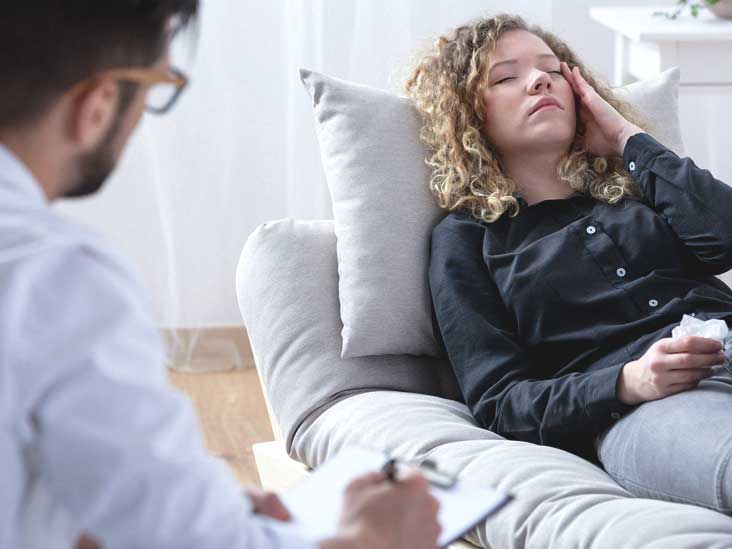“Prior to joining ADAA I wrote and produced several self-help audio programs including The Anxiety Solution Series, a 12-hour audio course, Stress Free, a compilation of six guided meditations, and The Personal Growth Series, a collection of seven hypnosis sessions. Since becoming a member of ADAA and being elected to their Board of Directors, I have completed two books: Break Free from Anxiety and The Emetophobia Manual. Although my practice in Los Angeles was focused on treating anxiety disorders, prior to joining ADAA, I did not know other therapists who shared the same specialty. Attending my first ADAA conference in 2013 changed that. The presentations filled the gaps in my knowledge and I met and become friends with other experts in the field. The articles I have written and the webinars and videos I have produced for the ADAA website on health anxiety, the fear of driving, and emetophobia, have helped thousands of people around the world and they have generated close to one hundred patients in my private practice. ADAA is an organization that uniquely benefits anxiety sufferers, therapist, and researchers.”
The illness you fear might not be the illness you have. I recently conducted an online support group for people with all sorts of health fears, from cancer and heart disease to ALS and MS. Each shared their worries about moles on the skin, irregular heart palpitations, and numbness and tingling. Although their specific fears varied, they all had one thing in common; none of them had ever been diagnosed with a series illness and they all related to the following scenario:
Dina felt great after getting a clean bill of health from her physician but as she tried to fall asleep, she dwelled on one statement he made, Tumors can grow at any time. Come back in six months if you’re concerned. Questions raced through her mind as she tossed and turned, Why did he tell me that? If there was nothing wrong, why would he say come back in six months? What if he missed something? Why do I keep getting headaches and dizziness? Dina felt so anxious she got out of bed and searched the web for answers. As she reread the same articles about symptoms of brain cancer, she began to feel lightheaded. Why do I keep feeling this way? Do I really have brain cancer? Is this really happening?
The good news was, Dina did not have brain cancer or a brain tumor. Dina had health anxiety. There are two types of health anxieties: Somatic Symptom Disorder and Illness Anxiety Disorder, formally known as hypochondriasis. Many people with health anxiety are often unable to function or enjoy life due to their fears and preoccupations. They obsess over bodily functions (breathing, heartbeat), physical oddities (skin blemishes), and physical discomfort (headaches, stomach aches, lightheadedness).They might worry about a specific organ (brain, heart) or a disease they heard about on the news or at work (MS, diabetes). They are preoccupied with the belief that they have, or are in danger of contracting, a serious illness. Many will purse doctors and tests repeatedly for reassurance, but are reluctant to seek mental health treatment since they believe their condition is medically based.
Why does health anxiety persist despite reassurance from doctors?
Although some refuse to be examined by their physician due to their fear of discovering the worst, seeking reassurance from doctors, insisting on repeated medical tests, and visits to urgent care, are more common in health anxiety. Being reassured by the doctor that there is no serious medical illness brings relief — temporarily. The vicious cycle quickly resumes as new thoughts and physical sensation surface, followed by googling and self-diagnosis, misinterpretations of news in the media, anxiety, and more visits to doctors to resolve the uncertainty. The cycle ignites with each new alarming thought or symptom.
The False Alarm
Car alarms are set off when a criminal breaks in but imagine how problematic it would be if the siren blared each time a pedestrian walked by. The car alarm would be misinterpreting innocent people as dangerous criminals.
With health anxiety there is the misinterpretation of discomfort and normal bodily sensations as dangerous. The body is very noisy. Healthy human bodies produce all sorts of physical symptoms that might be uncomfortable, unexpected, and unwanted, but not dangerous.
Normal sensations in the body that can produce fear and worry include changes in visual acuity, heart rate, blood pressure, saliva levels, depth of breathing, balance, and muscle tone, just to name a few.These are normal and harmless bodily changes, but when a person believes they are symptoms of a terrible disease, it causes anxiety.The sensations are real, but the beliefs are false.
Why do people misinterpret sensations in their body and overestimate danger?
Sometimes misinterpretation is due to assumptions about an illness. For example, “My cousin died of cancer. It’s only a matter of time until I get it.” Or, viruses sped easily. People in Africa are dying of Ebola. It could easily spread to the U.S. People with health anxiety might hold rigid definitions of good health, perhaps believing that any discomfort whatsoever means bad health.
Anxiety is a protective mechanism and scanning the body for an illness seems like the right thing to do to protect ourselves. However, when we are preoccupied with something, we tend to notice it. Last month when I was looking to purchase a new car, I suddenly began to notice every car on the road; the make, model, and the color. Previously, I didn’t pay attention. Looking for symptoms makes you notice subtle sensations you might otherwise ignore. When you become preoccupied with bodily sensations, those sensations become amplified and last longer.
This is when it gets tricky.
Each scan of the body produces uncertainty and doubt, giving the imagination opportunity to create stories. As you imagine the worst, your body’s alarm system sounds off in the form of symptoms of anxiety (racing heart, tightness in the chest, difficulty breathing, jitters, tingling, lightheadedness, nausea, stomach discomfort, sweating, headaches, etc.) giving your imagination additional fuel to create great works of fiction.The symptoms are real. The thoughts are false.
The Most Effective Treatment is Cognitive-Behavioral Therapy
Since it is possible to suffer with anxiety and a serious medical condition, medical problems must be ruled out with a thorough physical exam. Once this is accomplished, Cognitive Behavioral Therapy (CBT) is the most effective treatment for any form of anxiety including health related anxiety.
CBT is a therapy model that focuses on our cognition, the way we think, and our behaviors, the way we act. The main concept behind CBT is that our thoughts about a situation (the fear of ALS) effect how we feel (afraid and anxious) and how we behave (holding out our hands to see if they are trembling). We tend to assign meaning to specific situations (tingling means we have MS). It’s not the actual situation causing our anxiety, but the meaning – accurate or not. And, when you have anxiety, you give your thoughts a lot of meaning, and thus, a lot of power.
CBT aims to help you overcome fears by correcting irrational thoughts and changing problematic behaviors. By acquiring a certain mindset, you can learn to approach anxious situations differently and learn to tolerate discomfort and uncertainty. Illness anxiety can be overcome with the help of a skilled anxiety specialist and CBT. You can find a therapist in your state on the ADAA website. And for additional information on Illness Anxiety watch my free ADAA webinar.
Additional Resources:
What is health anxiety?
Health anxiety is an obsessive and irrational worry about having a serious medical condition. It’s also called illness anxiety, and was formerly called hypochondria. This condition is marked by a person’s imagination of physical symptoms of illness.
Or in other cases, it’s a person’s misinterpretation of minor or normal body sensations as serious disease symptoms despite reassurance by medical professionals that they don’t have an illness.
What’s the difference between concern for your health and health anxiety?
If your body is sending you signs that you’re ill, it’s normal to be concerned. Health anxiety is marked by constant belief that you have a symptom or symptoms of a severe illness. You may become so consumed by worry that the distress becomes disabling.
If you’re concerned about your health, the rational thing to do is see your doctor. With health anxiety, you’ll feel extreme distress about your real or imagined symptoms even after medical test results come back negative and doctors reassure you that you’re healthy.
This condition goes beyond having a normal concern for one’s health. It has the potential to interfere with a person’s quality of life, including their abilities to:
- work in a professional or academic setting
- function on a daily basis
- create and maintain meaningful relationships
What causes people to develop health anxiety?
Experts aren’t sure of the exact causes of health anxiety, but they think the following factors may be involved:
- You have a poor understanding of body sensations, diseases, or both of these things. You may think that a serious disease is causing your body’s sensations. This leads you to look for evidence that confirms that you actually have a serious disease.
- You have a family member or members who worried excessively about their health or your health.
- You’ve had past experiences dealing with real serious illness in childhood. So as an adult, the physical sensations you experience are frightening to you.
Health anxiety most often occurs in early or middle adulthood and can worsen with age. For older people, health anxiety may focus on a fear of developing memory problems. Other risk factors for health anxiety include:
- a stressful event or situation
- the possibility of a serious illness that turns out to not be serious
- being abused as a child
- having had a serious childhood illness or a parent with a serious illness
- having a worrying personality
- excessively checking your health on the internet
How is health anxiety diagnosed?
Health anxiety is no longer included in the American Psychological Association Diagnostic and Statistical Manual of Mental Disorders. It was previously called hypochondriasis (better known as hypochondria).
Now, people who had been diagnosed with hypochondria might instead be classified as having:
- illness anxiety disorder, if the person has no physical symptoms or only mild symptoms
- somatic symptom disorder, particularly when the person has symptoms that are perceived as distressing to them or if they have multiple symptoms
To arrive at a health anxiety disorder diagnosis, your doctor will perform a physical exam to rule out any health conditions you’re concerned about. If you’re healthy, your doctor may refer you to a mental healthcare professional. They will likely proceed by:
- performing a psychological evaluation, which involves questions about your symptoms, stressful situations, family history, worries, and issues affecting your life
- asking you to complete a psychological self-assessment or questionnaire
- ask about your use of drugs, alcohol, or other substances
According to the American Psychiatric Association, illness anxiety disorder is marked by:
- preoccupation with having or coming down with a serious illness
- not having physical symptoms, or having symptoms that are very mild
- excessive preoccupation about an existing medical condition or a family history about a medical condition
- performing unreasonable health-related behaviors, which may include:
- screening your body for disease over and over
- checking what you think are disease symptoms online
- avoiding doctor’s appointments to avoid diagnosis with a serious illness
- preoccupation with having an illness for at least six months (The illness you’re worried about might change during that period.)
How is health anxiety treated?
Treatment for health anxiety focuses on improving your symptoms and ability to function in daily life. Typically, treatment involves psychotherapy, with medications sometimes added.
Psychotherapy
The most common treatment for health anxiety is psychotherapy, particularly cognitive behavioral therapy (CBT). CBT can be very effective in treating health anxiety because it teaches you skills that can help you manage your disorder. You can participate in CBT individually or in a group. Some of the benefits of CBT include:
- identifying your health anxiety worries and beliefs
- learning other ways to look at your body sensations by changing unhelpful thoughts
- raising your awareness of how your worries affect you and your behavior
- responding to your body sensations and symptoms differently
- learning to better cope with your anxiety and stress
- learning to stop avoiding situations and activities because of physical sensations
- avoiding examining your body for signs of illness and repeatedly looking for reassurance that you’re healthy
- boosting your functioning at home, work, or school, in social settings, and in relationships with others
- checking whether or not you’re suffering from other mental health disorders, like depression or bipolar disorder
Other forms of psychotherapy are also sometimes used to treat health anxiety. This may include behavioral stress management and exposure therapy. If your symptoms are severe, your doctor may recommend medication in addition to your other treatments.
Medication
If your health anxiety is improving with psychotherapy alone, that is generally all that will be used to treat your condition. Some people don’t respond to psychotherapy, however. If this applies to you, your doctor may recommend medications.
Antidepressants, such as selective serotonin reuptake inhibitors (SSRIs), are frequently used for this condition. If you have a mood or anxiety disorder in addition to your anxiety, medications used to treat those conditions may also help.
Some medications for health anxiety come with serious risks and side effects. It’s important to review your treatment options with your doctors thoroughly.
What is the outlook for health anxiety?
Health anxiety is a long-term medical condition that can vary in severity over time. In many people, it seems to worsen with age or during times of stress. However, if you seek help and stick to your treatment plan, it’s possible to reduce your health anxiety symptoms so you can improve your daily functioning and decrease your worries.



